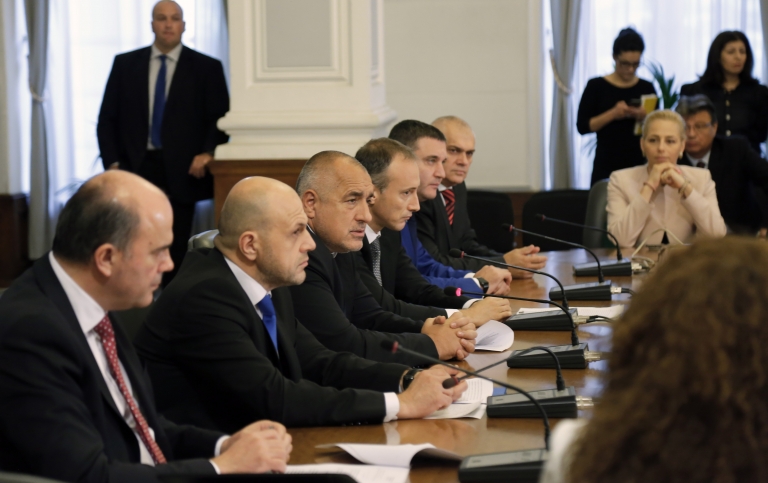
04.07.2017
“A main priority for the government is that each child attends school and receives good education. All programs – for innovations, for economic growth, for qualification and re-qualification, depend on the education system. The most important thing for Bulgaria is to have educated people.” This was said by Prime Minister Boyko Borissov at the presentation of the inter-institutional mechanism for inclusion and retention of children and pupils in the kindergartens and schools, adopted today by the Council of Ministers. At the presentation, also present were the Deputy Prime Minister responsible for the field Tomislav Dontchev, the Minister of Education and Science Krassimir Valchev, the Minister of Finance Vladislav Goranov, the Minister of Interior Valentin Radev, the Deputy Ministers of Education and Science Tanya Mihaylova and Denitsa Sacheva, as well as representatives of the Agency for Social Support, the Directorate General “Citizens’ Registrar and Administrative Services”, and regional management departments for education.
According to the Prime Minister, the institutions should be part of the process by means of all available resources. “We must build a highway of knowledge. Unemployment at the moment is 6% and cannot be further decreased because part of the different ethnic groups cannot read and write. Bulgaria will be measurable with the other countries when its productivity rate increases. We need education and qualified labor force,” highlighted Borissov. According to him, it is important and compulsory by law that each child attends school. The Prime Minister was categorical that there is no other government in recent years that so clearly and with concrete numbers put education as a priority. He commissioned the Minister of Education and Science Krassimir Valchev to suggest a new formula for motivating those teachers that work in a more difficult environment. “They need more and specific support,” said Prime Minister Borissov and added that the government will devote 330 million BGN yearly for education until the end of its term of office.
Deputy Prime Minister Tomislav Dontchev underlined that ¼ of children from Roma origin and 10% of children from Turkish origin do not attend school. According to data from the National Statistical Institute during the school year 2015/2016 21 170 pupils have left the education system, which means that each seventh pupil between the age of 15 and 18 has not graduated school. The main reasons are related to social and economic factors, institutional problems, migration, residence factor and living environment ethnic cultural factors, as well as other problems.
“Lack of education is very easily transferred from one generation to another. Children should be captured in pre-school age. All results from international research point out that those that attend kindergarten have better education results,” commented the Minister of Education and Science Krasimir Valchev. He added that the inter-institutional mechanism is a proof that all policies for inclusion and retention of children in schools and kindergartens will be implemented.
The mechanism that was adopted today foresees that in each place of residence with a school, teams will be formed by 20 August 2017 that will ensure the registration of all children in kindergartens and schools. The teams will include representatives of regional management departments for education, of kindergartens and schools, municipalities, the agencies for social support and the directorates of the Ministry of Interior. If need be, in the places of residence where there is available resources, employees from other places. The teams will be confirmed by the leadership of the regional management departments for education. Their responsibilities include the task to identify children in risk of leaving the education system, as well as to take measures for additional support.
Deputy Prime Minister Tomislav Dontchev explained that it will be monitored on a daily basis how many children do not attend school. According to him, this is the responsibility not only of the schools but of all institutions. “The problem does not exist only in the class room. The institutions should mobilize themselves, they should enter the neighborhoods, concrete families. They should see what it is that children need. These problems can be solved through various mechanisms,” said Dontchev. His statement received support from Minister Vladislav Goranov, who said that education is a right by constitution and parents ought to ensure it.
According to information provided by the Citizens’ Registrar and Administrative Services until 31 August 2017 the mayors of municipalities should prepare a list of children who should have started attending school or kindergarten last year but have not been registered. The teams will visit their homes and talk to their parents. Mediators and local communities will be involved in the process of convincing the parents to send their children to school. The mechanism also foresees optimization of the procedure for receipt of family and other financial support according to the individual needs of the children and pupils. The collected information will be provided to the mayors of municipalities so as to allow them to detect violations of the Law for Pre-school and School Education. If any of the children are not found in their homes, assistance from the Ministry of Interior. “The MOI will make efforts because it is better to take care of the children now than to deal with criminals afterwards,” said the Minister of Interior Valentin Radev.